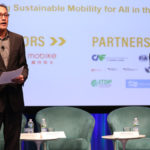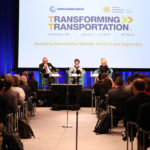Search Results
The majority of the energy used by buildings is wasted, resulting in increased energy costs and air pollution. Among C40 cities, this translates to between 50 percent and 75 percent of citywide carbon emissions. Therefore, due to the sheer amount of energy consumed by buildings, ...

China has more than 16 million bikes on the streets today that don’t belong to anyone and pass from rider to rider with the tap of a smartphone. With the new addition of new dockless models, many are simply left ...

Countless cities are struggling to rein in development that is pushing their peripheries further and further from the city center. By 2030, many medium-sized cities in the global south are projected to double or triple in population, and much of ...

Beyond the technological revolution underway in transport today, gender was an underlying theme of Transforming Transportation this year. Transport is not gender neutral, not matter where you are, said a chorus of experts during the opening panel on day two. “Gender is often a more robust determinant of modal choice than ...

Dozens of “dockless” bike-sharing startups have emerged in the past few years, offering apps where riders can locate bicycles, unlock them and leave them wherever their ride ends. The result in some Chinese cities has been more than a million ...

“We are seeing in cities around the world and transport systems around the world, the beginning of a revolution,” said World Resources President and CEO Andrew Steer in Washington today. Welcoming more than 800 transport experts, policymakers, researchers and private ...

Exponential progress in how we collect, process and use data is fundamentally changing our societies and economies. But the new digital economy depends fundamentally on a very physical enabler. Amazon and Alibaba would not exist without efficient ways to deliver ...

Fewer than 3 people per 100,000 are killed in road crashes in Sweden every year, less than almost anywhere else in the world. In contrast, it’s 11 per 100,000 in countries like India and the United States. One reason for ...

Investment in infrastructure is vital for cities to function and prosper. But many local governments struggle to finance large infrastructure projects while a huge proportion of their residents live in poverty. Two pioneering cities – Hyderabad and Kampala – have ...

“Ride-hailing” or “ride-sourcing” companies like Uber, Easy Taxi, Ola and Didi have made it much easier for passengers to get around cities everywhere, providing real-time location data, increasingly accurate arrival times, seamless payment and customized services. Goldman Sachs estimates the ...

Across the world, it’s becoming clearer that development goals must be urban goals. As their populations and global connections grow, cities account for an ever-growing portion of the global economy. But despite their prominence, cities can’t do it alone. Local ...

There were 663 million people without access to safe drinking water in 2015, according to the United Nations and World Health Organization. Many of those going without are from low-income households in cities across the global south. Jenna Davis, associate professor ...

What is a sustainable city? What can cities do to reduce their carbon footprints while expanding transit networks and economic growth? In 2017, TheCityFix addressed some of the most burning questions in urban development, informing city leaders and decision-makers on ...

This series, supported by the Volvo Research and Educational Foundations, discusses walking and cycling in cities with a special focus on low- and middle-income countries. In 2015, 447 pedestrians were killed from traffic-related incidents in Nairobi, Kenya’s capital of more than ...

2017 was a tumultuous year in some respects. We’ve seen major natural and man-made disasters, disruptive new politics in many countries, and an upswing in carbon emissions. But it was also a year that strengthened the role of cities at ...

Page 45 of 228« First...1020...444546...5060...Last »






















